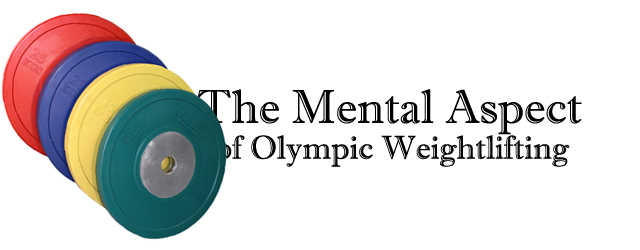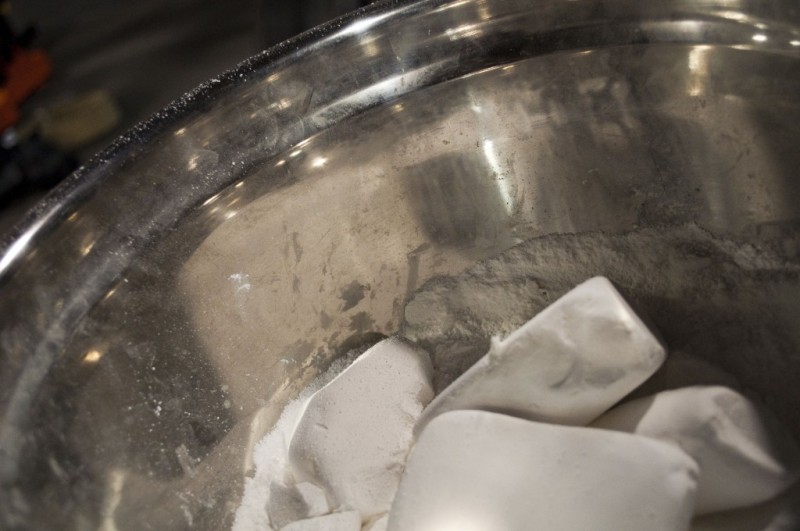
Mental Aspect of Olympic Weightlifting
Throughout my time as a powerlifter, I've considered one of my strongest advantages over the competition to be my ability to psych myself up for a lift and make an attempt that I likely couldn't get if I stayed at a normal level of arousal. This has helped me gain many personal records and secure a few first-place positions late in meets.
I was known around my gym and by other area lifters as the guy who hit himself, headbutted objects, and always had plenty of ammonia on hand. When I made the transition to Olympic-style weightlifting, I assumed that the benefits would carry over, and I continued with my old ways before PR attempts or heavy sets in training.
At the start of my weightlifting career, I was making steady progress with PRs, mostly due to enormous improvements in technique and the fact that I was coming back from a serious hand injury, which caused my starting weights to be embarrassingly low. However, one trend I noticed was that my lifting was wildly inconsistent. I chalked this up to being new to the lifts, and I blamed my well-documented lack of athleticism or simply resorted to self-deprecating humor. This was passable in training, as I could make as many attempts as I wanted at a weight without any fear of bombing out of a workout. I can recall a few instances where attempts went into the double digits before a successful lift was made. Rest assured, by the time the eleventh or twelfth attempt at a weight rolled around, I had neither the energy nor the desire to psych myself up for a lift. Yet I didn't make any connection between my calm and focused mental state and a successful lift.
First Meet
Enter my first weightlifting meet in May 2012...
As is routine for me before any type of competitive event, I went to bed the night before so nervous I was shaking and woke up dry heaving that morning. I believe that had I not been cutting weight and had I not been without food for 24 hours, it wouldn't have been dry heaving!
As I had learned from my powerlifting days, I set my opening snatch at a weight I knew I could make every single time no matter what. My warm ups went OK at best. I was already fired up in the warm-up area, moving the bar like I was trying to hit the ceiling with it, but my positions, technique, and rhythm all felt off for some reason. “No worries,” I thought, “I’ll just pull the crap out of this and it won't be a problem.”
I approached the bar shaking from the energy, let out a yell, and let loose with the single worst snatch of my entire life, missing it behind me. The bar and my self-worth bounced off the platform at the same time, and I headed back to the chalk bowl to await my second attempt at the weight. More arousal, more failure, more frustration. By the time my third attempt at my “guaranteed to make it” opener had arrived, I was absolutely disgusted with myself. A head punch and some very negative self-talk later, I grabbed the bar, got lucky on an equally awful lift, waited for the down signal, and slammed the bar to the platform. Because I'm a little more proficient (or at least consistent) at the clean and jerk, that session went fairly well, although I still left weight on the platform thanks to some adrenaline-fueled miscues.
Arousal Rates
After the meet, I heard an impressive variety of references to my mental state of disaster. The one that stuck out the most was a text I received a few days later from my mentor and boss. He was at a national coaches’ conference and ran into a coach who happened to be lifting in my class. This coach told him to relay to me that I needed to read the section of the NSCA Essentials book about arousal rates in reference to skill levels required for a task. Admittedly, I don’t have the book and was too downtrodden to seek it out to read this section, but the seed was planted.
Conveniently, I started a Psychology in Sport and Exercise class two short weeks later, my performance still fresh on my mind. Browsing through the book, I found the chapter on arousal levels and immediately read it. To provide a very succinct summary, I learned that in new or complex activities, there is a strong inverse relationship between arousal levels and performance. This had me thinking, and I immediately laid down a few rules for my training from that day on—all attempts of the competition lifts and their variants would be made as calmly as possible, and I wouldn't do any special routines before training sessions (i.e. special music, energy drink simply for the sake of training, psych up on my way to the gym).
Consistancy
It took a bit of getting used to, but as I worked through my training cycle, I found that I was able to casually approach the bar and make lifts even during my 90 percent week. In fact, I was making weights so consistently that I ended up doing almost double my planned volume, and the lifts felt effortless. I was starting to think the science of what I had read was justified.
When weightlifting meet number two rolled around, I still had my traditional sleepless night followed by a morning with a very rocky stomach, but I felt confident that something was different this time. I was joking and friendly in the warm-up area, and my lifts felt crisp and light. I practiced the “relaxation breaths” outlined in my sport and exercise psychology book, even going so far as to replace my pre-lift yell with one more breath. Not surprisingly, the first attempt was successful, as were the next two, giving me a 4-kg PR and a level of excitement I haven’t felt in a long time. After I relaxed, it was time to move on to the clean and jerk. My first two attempts were good, but it seemed apparent to me—and probably everyone watching—that my second attempt was a max for the day. However, my coach called for a 5-kg increase and a 7.5-kg PR. As the weights were loaded, he said “No adjustments. Just get intense.” Out came the fired-up Jordan, only this time I was extremely confident and positive. The weight flew up, and I was given three white lights for my first perfect meet in any discipline.
Confidence
There are a few points I really took home from my second meet and the training leading up to it. First, get yourself a competent coach or handler for your meet. I was told when to warm up and what weight to do and all attempts were chosen without any consideration from me. Second, save the psych ups for when they’re truly applicable. By waiting until the last attempt of the meet to get fired up, I ensured that I would be leaving much less weight on the platform than if I were to miss the weight from a stupid mistake. It also allowed my earlier success to build my confidence for later in the meet when I needed it the most. The final lesson I learned from this experience was to practice as if you’re going to play. By training calm and not allowing myself to get away with miss after miss, I was able to more closely mimic how I planned to and needed to compete. These changes led to me being much more comfortable on the platform, which is an enormous positive.
Now, I’m not a top ten lifter, and like I said earlier, I’m new to the sport. So it could be easy to blow off what I’m saying due to the insignificance of the weight I’m lifting compared to national competitors. But no matter the kind of lifting, I think for all the work lifters put in trying to get stronger and perfect technique, it's definitely worth trying out a few changes in mental preparation.









